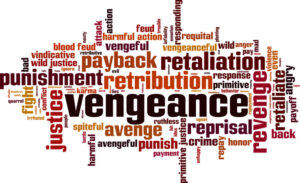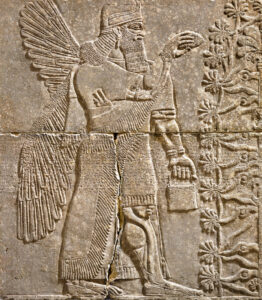The Foundation of the Book of Job

We can look at the world around us and wonder will there ever be justice for the death, destruction and war in Ukraine. We can ask why God allowed hundreds of thousands of people to die from COVID; from AIDS; from ebola. Will there ever be justice for the genocide of the Tutsi people in Rwanda; for the victims of terrorism? These questions wrestle with a theological problem called theodicy, how can God be said to be good, righteous, and powerful in a world full of such disorder and evil? Walter Brueggeman, a Biblical scholar, suggested these are echoes of the dilemma of Job.
The problem of theodicy is a concern throughout the Bible, from the first pronouncement of judgment against the entire human race for the sin of Adam in Genesis, to the last plague of Revelation. But John Walton sees the dilemma of Job more particularly as the retribution principle. Satan, the adversary, claimed Job’s blamelessness and uprightness was simply because God has “blessed the work of his hands” and put a hedge around him and all that he has. If he were to lose all that he has, Satan said Job would curse God to his face (Job 1:9-12).
The retribution principle essentially says the people get what they deserve. The righteous prosper and the wicked suffer. Satan voiced this principle to God in Job 1:9, when he asked: “Does Job fear God for no reason?” The implication is that Job follows the retribution principle and obeys God because he knows it will result in his prosperity. If God were to reverse that and have Job suffer despite his righteousness, Satan predicted Job would curse God to his face (Job 1:11).
The retribution principle is an attempt to understand what God is doing in the world, to articulate it, to justify it, to systematize the logic of how God is working in the world, that God is working a justice system. You do good, you get good. You do bad, bad things happen. So, the retribution principle assumes an understanding of how God works in the world. It’s an attempt to sort of quantify or systematize it.
It’s common for people to assume their circumstances in life somehow reflect that they are in favor with God or the gods; or that they are out of favor. The retribution principle is behind the modern idiom, “What goes around comes around.” We casually say when something goes well, “Oh, I must be doing something right.” Or, “What did I do to deserve this,” when things go badly. But people in the ancient Near East widely thought that way too.
In fact, the book of Job is putting the retribution principle under the microscope because Job and his friends all believe very firmly in the retribution principle. That’s really part of the problem. They see the retribution principle. Not only do you assume that if someone is righteous, they will prosper and if someone is wicked, they will suffer, they also turn that around. If someone is suffering, they must be wicked. If someone is prospering, they must have done something right. And so, when Job’s circumstances turn so dramatically, so tragically, we know what conclusion everyone is going to draw. They’ll decide he must’ve done something really, really bad to bring this kind of disaster, to go from the heights to the depths.
That is really what we see with Job. He was living the lifestyle of the rich and famous and he fell into the lowest depths of suffering. Walton said remembering those extremes is important in order for us to think clearly about the retribution principle as we read Job. If the retribution principle is truly part of God’s policies, yet righteous people like Job suffer, then God’s justice is suspect. This seems to be the belief of Job’s wife, who encourages him to curse God and die (Job 2:9).
But if the retribution principle brings benefit and prosperity to good, righteous people, it is detrimental to true righteousness, because it sets up an ulterior motive, the anticipation of gain for doing good.
Walton suggested thinking about there being a triangle of claims within Job. At one of the lower ends of the triangle is the retribution principle; at the other lower end is Job’s righteousness. At the top of the triangle, is God’s justice. As long as Job is prospering, the triangle holds together nicely. “God is doing justice. Job is righteous, and the retribution principle is true and everything’s happy.”
But when righteous Job begins to suffer, something is wrong with the triangle of claims and it begins to fall apart. All three corners of the triangle— God’s justice, Job being righteous, and the retribution principle—can no longer all be true. But which two do you hold on to? You can’t hold on to all three; something’s got to give.
Job’s friends hold fast to the retribution principle. “Repeatedly in their speeches, they affirm the retribution principle. They apply it; they use it as part of their argumentation.” Are they really going to say God isn’t really being just with Job; or are they going to say Job isn’t really righteous? They continue to affirm God’s justice and ask Job what he did to deserve his suffering. But Job holds onto his righteousness.
Job tries to find fault with the retribution principle, but he really can’t. An so he turns his eyes towards God, and as Job’s speeches continue, they become more and more accusing of God; it becomes more and more doubtful, skeptical about God and whether He does justice at all. So, Job builds his house in his own corner and holds onto the retribution principle. He’s giving up on God’s justice.
Elihu Redefines the Retribution Principle
Then another voice, that of Elihu, who had kept quiet because of his youth, enters into the discussion. He takes his stand on God’s justice, essentially saying the retribution principle is true, but Job and his friends have got it wrong. Elihu wants to refine and expand it. He says most people think it refers to bad things you’ve done in the past— people get what they deserve. Elihu says this way of thinking about the retribution principle makes it remedial; fixing or responding to what’s gone wrong. But what if it is actually preventative, or developing?
It’s not so much what you did in the past that’s causing negative consequences, it’s something you are just getting ready to get involved in that you’re on the brink of this kind of behavior; that it’s supposed to turn you away from it. So, the retribution principle could be a response to, present developing things, instead of things in the past.
So, Elihu doesn’t have to find unrighteousness in Job’s past. He says the reason for Job’s suffering is his self-righteousness—his willingness to vindicate, to justify himself at the expense of God. The problem is not what Job did before his suffering began. It has become evident in how he responded once the suffering started. The problem is Job’s self-righteousness.
Walton said this seems to be cheating with the dilemma of the triangle of claims. By redefining what the retribution principle means, it gives Elihu an alternative the others never thought of and could not choose. Job himself is also less able to defend himself; and as he continues to affirm his righteousness, his self-righteousness becomes clearly evident. Elihu sees Job more realistically, more appropriately than the other friends. But he has his own problems because he makes the retribution principle the foundation for how he understands how God is working in the world.
How can we resolve these tensions? Bad things do happen to good, righteous people and evil people do prosper. How can we resolve the tension of the retribution principle? “Most people at one time or another experience life in such a way that it looks suspect to them. How are those tensions resolved?”
One way is to qualify the nature of God. Walton said this is what people did in the ancient Near East. “They had no confidence that God was acting justly.” Others qualified the purpose of suffering. Some said it was character-building. Today, they might refer to it as participating in Christ’s sufferings. They ultimately qualify the purpose of suffering. Walton said this does resolve some of the tensions in the retribution principle.
In the biblical texts, the Psalmist sometimes thinks about timing. In the lament psalms, most of the lamenting is in the context of the retribution principle. Why is this happening? Eventually things will smooth out. God will, at the appropriate time, act against the enemy. In Christian theology, we look to eternity. Things may be bad now, but on the scale of eternity, the things we suffer now are minor.
Or you could qualify the retribution principle according to the role of justice in the world. God acts justly, but we live in an unjust, chaotic world. “In this world, non-order continues.” We know that he hasn’t made the world conform to his own justice, because we know we’re sinful and yet we still exist. “If the world fully conformed to God’s justice, it wouldn’t be a world we could life in.” Therefore, perfect justice is not obtainable in a fallen world.
God and his world are different and he has not imposed his justice upon it. In his wisdom, God is concerned with justice. But given the constraints of an imperfect, fallen world, a not-yet fully ordered world, we’re not living in a perfectly ordered world yet. And therefore, it does not reflect his attributes throughout. None of these explanations is completely satisfying.
Walton suggested we think of the retribution principle as proverbial in nature. It’s often how things are, but does not always explain how things work. It’s not a guarantee or promise. And it does not provide an explanation of all the suffering or evil in the world.
The retribution principle tells us about the heart of God. He delights in giving good things to those who are his faithful servants. He also takes seriously the need to punish wicked people. “But he doesn’t carry those things out throughout, because it’s a fallen world and none of us could live through that.”
We shouldn’t expect it to work all the time. We have the theology of God—what he is like—standing against the theodicy of God, which explains life as we experience it. The contrasting positions of the theology and theodicy compels us to turn to God and ask him to resolve the dilemma.
The book of Job is, as it were, doing some radical surgery to separate these two principles so we don’t make the mistake of thinking that a theology of God leads to an explanation of how he is working in the world. Yahweh’s justice must be taken on faith rather than worked out philosophically. God does not need to be defended. Our attempts at theodicy, are in one sense, an insult to God. “He doesn’t need our defense.”
Walton added we cannot defend him very ably anyways. God wants to be trusted. We can’t tell when God is going to choose justice or when he’s going to choose mercy. We can’t tell where his compassion might override something else that he “ought” to be doing. Justice is a part of God, but does not trump all the other attributes God has.
Jesus and the Retribution Principle
Jesus was repeatedly challenged with retribution questions. For example in John 9, Jesus heals the man born blind. The disciples posed the retribution principle in their question saying, “Rabbi, who sinned, this man or his parents, that he was born blind?” If the answer is the man sinned, why was he was born blind. If the answer is his parents, why did he suffer? Their question is a question of cause; a theodicy question.
But Jesus said: “It was not that this man sinned, or his parents, but that the works of God might be displayed in him.” In effect, Jesus tells them not to look to the past and ask about cause. That’s not the answer. Instead, he tells them to look to the future and think about purpose, namely that the works of God might be displayed. The glory of God is a purpose, not a cause.
Walton said this was the same answer Job got from God—“trust God’s wisdom and seek out his purpose.” Don’t expect to get causal explanations. When Jesus addressed issues concerning retribution principles, he consistently turned away from giving reasons or explanations for cause and pointed to what God intended to do. That’s essentially what the book of Job is about.
This was a retelling of Lecture 7 of Dr. John Walton’s YouTube series of 30 mini lectures on the book of Job, “Theological Foundation: Retribution Principle, Tringle.” Dr. Walton also wrote the commentary on Job for NIV Application Commentary Series, for which he was one of the contributing editors for the Old Testament.



